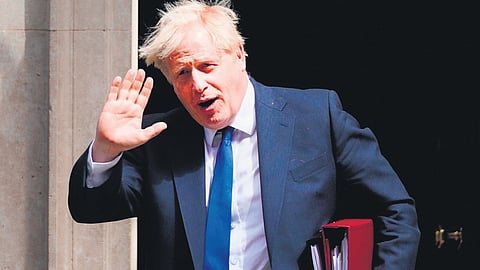'Unleashed' book review: The many sides of Boris Johnson
The irony of the title Unleashed, the recently released memoir of the former British Prime Minister Boris Johnson, is inescapable. Not only does he unleash his memoir in a torrent of verbosity, but also in a tone marked by self-adulation, self-righteousness, and triumphalism as he recounts his days as the Mayor of London, followed by stints as foreign secretary, and finally the Prime Minister.
Indeed, by the end of the memoir, you’re left wondering why the Conservative Party leader has devoted so many pages to his stint as London mayor that would be of limited interest to non-Britons. Not all is, however, lost for the reader wading through this memoir running into 738 pages (minus the notes), as BoJo has some riveting details and encounters to share on the foreign policy front during his stint as the Prime Minister.
The suggestion that Israeli PM Benjamin Netanyahu could have bugged his office’s washroom in Whitehall during a visit when he was the foreign secretary, the conversations he had with Russian President Vladimir Putin in the weeks ahead of Ukraine’s invasion, wherein the latter assured him he wouldn’t do so, his conversation with Ukrainian President Volodmyr Zelensky soon after the invasion, wherein he implored BoJo for more weapons, all leave you wanting more details.
Indeed, the memoir would have made for a more substantive read if BoJo wrote more expansively about his stint as the foreign secretary and then as PM rather than crowing about his achievements as mayor, page after page. There is a detailed account of Britain’s efforts to exit the European Union, understandably so, given BoJo as PM had to steer his country through it, as well as the Covid pandemic his government had to tackle.
Not surprisingly, he’s chosen to paper over the ‘Partygate’ controversy, where he was fined for hosting a party during the Covid lockdown. Instead, he outrages, “I saw no cake. I ate no blooming cake. If this was a party, it was the feeblest event in the history of human festivity.” But then in his memoir, BoJo obviously would want to come out smelling of roses, no matter what position he holds and what he does.
It’s in the copious details during his mayoral stint that you first come across his numerous swipes, at not just rivals but former colleagues within the government. There is almost a schoolboy-like glee when he describes Theresa May, his predecessor and under whom he served as foreign secretary. He was “particularly fixated upon her nostrils – immensely long and pointy black tadpole shapes, like a Gerald Scarfe cartoon….”.
Such hyperbolic flourishes, at times decidedly delightful, are used for other world leaders as well. Donald Trump, now set to take over as the US President finds mention thus: “A strange phenomenon was now dominating the American political landscape like an orange-hued dirigible exuberantly buoyed aloft by the inexhaustible primus stone of his own ego.” At another point in the memoir, BoJo is having “an enjoyable bilateral meeting with Trump and his giant inflatable personality”.
Devoting a chapter to ‘Britain and India’, Johnson recalls how, as London mayor on his first trade trip to India in 2012, the foreign office was “distinctly sniffy” and told him not to meet then Gujarat chief minister Narendra Modi, who they described as a “Hindutva nationalist.” True to his penchant for hyperbole, though Johnson, on his meeting with Modi, says, “I felt his (Modi’s) curious astral energy”.
He has also given a fascinating account of the role he played in scuttling an Australia-France submarine deal during a meeting of G-7 leaders in Carbis Bay in the UK. Canberra was not keen on going ahead with the deal, and BoJo writes he played “matchmaker,” facilitating a quiet meeting between Australian PM Scott Morrison, US President Joe Biden, and him.
Biden’s assent was needed for the nuclear-powered submarine deal that Australia went onto sign with the UK and US (AUKUS). French President Emmanuel Macron, who was also at the Summit, did not get wind of the meeting and was understandably outraged when Canberra called off the submarine deal.
There is also an interesting recall of a meeting he had with leader and Nobel prize winner Aung San Suu Kyi, who fell from favour with the West after the Rohingya Muslims were targeted in Myanmar. Visiting Myanmar as foreign secretary, he met Suu Kyi, who was then the state counsellor. They recited poetry to each other, including Tennyson’s Ulysses, but they also talked about matters of the State.
BoJo writes that he raised the Rohingyas issue. “But whatever I said to her seemed to fall on deaf ears.” All in all, BoJo would understand the value of brevity, having been a journalist earlier. He would have done well in keeping this in mind writing his rambling memoir, often devoid of gravitas.
The writer is a journalist who writes on foreign affairs.
‘Johnson recalls how, as London mayor on his trip to India in 2012, the foreign office was distinctly sniffy and told him not to meet then Gujarat chief minister Narendra Modi, who they described as a Hindutva Nationalist.’

